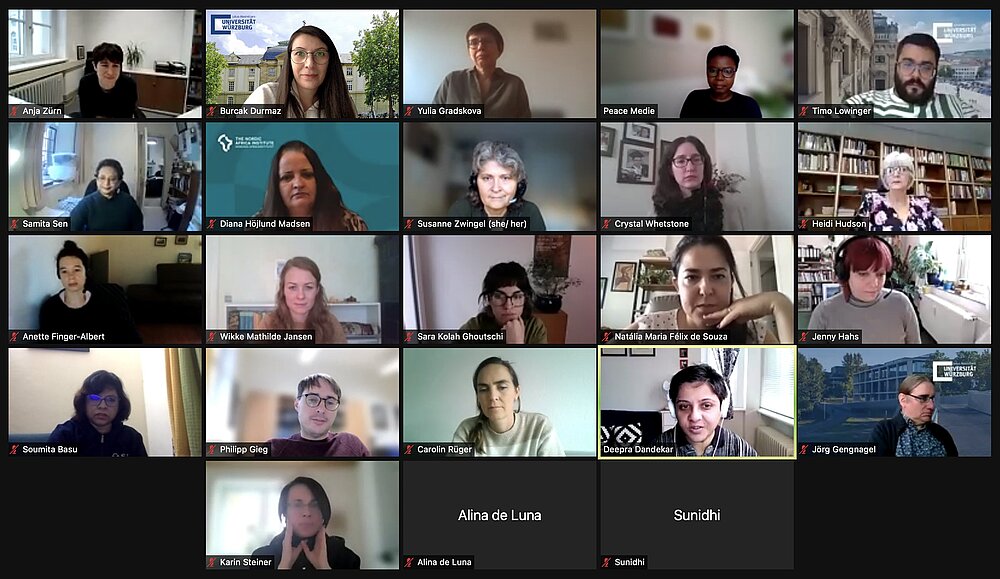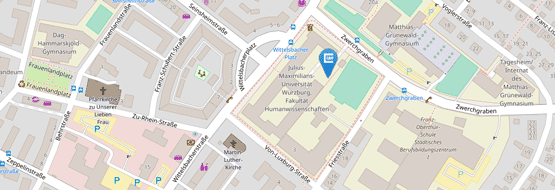Workshop: Listen to the Global South! Uncovering the Roles of Southern Actors in Writing Global Gender Norms

Despite the diversity in the roles and backgrounds of gender advocates, global gender norms are often associated with cultures and intellectual traditions of the Global North and are thought to be written predominantly by Northern actors. This impression is also reflected in the discipline of International Relations, where gender-related research from the Global South does not receive due attention. To get to the very bottom of this issue, our virtual workshop titled "Listen to the Global South! Uncovering the Roles of Southern Actors in Writing Global Gender Norms" had the objective to spotlight the persistent marginalisation of the Global South in the narratives on global gender norms and the reasons for, and implications of, the same.
The workshop was held on December 1st and 2nd 2021 within the framework of the Indo-German M.S. Merian – R. Tagore International Centre of Advanced Studies "Metamorphoses of the Political" (ICAS:MP). Organised by Soumita Basu (South Asian University, New Delhi), Peace A. Medie (University of Bristol), Anja Zürn, Philipp Gieg and Timo Lowinger (Julius-Maximilians-University Würzburg), the workshop welcomed renowned experts and young scholars from all over the world to present their findings in order to assess the impact of Southern actors, such as feminist networks, "femocrats", state actors or international institutions in renegotiating the asymmetric relationship in the global framing process of gender norms. With the variety of case studies presented, a historical framing of the workshops' leitmotif was made possible – allowing for a distinct look at conducive and obstructive path dependencies in the construction of global gender norms.
Regarding the question of applicability of predominantly Northern approaches, the various case studies concluded that global gender norms do not account for historical, social, and cultural dynamics that inform the understanding and discourses around gender norms in the Global South – creating greater challenges for the implementation. Particular attention in this context was paid to United Nations Security Council Resolution 1325 on Women, Peace and Security whose practices and implementation in the Global South was examined in more detail.
Finally, by illustrating significant contributions of Southern actors in the global framing of gender norms and proposing counter-hegemonic concepts, the participants of our virtual workshop not only traced down reasons for the blind spots in IR scholarship but also provided alternative concepts, aiming for a multifaceted approach in studying the impact of Southern actors on gender norms.
The workshop program started with Yulia Gradskova's (University of Stockholm) illustration of the Women's International Democratic Federation's global impact on the importance of women's rights to work and equal pay during Cold War confrontation and Jenny Hahs' (University of Bremen) findings on the influence of Southern actors within the ILO. This way, a historical framing of the workshops’ leitmotif was made possible, allowing for a distinct look at conducive and obstructive path dependencies in the construction of global gender norms.
Wikke Jansen (Humboldt University, Berlin) and Sara Kolah Ghoutschi (University of Marburg), on the other hand, displayed the potential to counter normative biases between the Global North and Global South by analysing the applicability of predominant Northern models of gender and sexuality in Southeast Asian societies and the capabilities of youth and feminist actors and their role in the translation process of gender and sexuality education.
By highlighting the Caribbean feminist organisations’ significant contribution in the global framing of gender norms and proposing counter-hegemonic human rights concepts, Susanne Zwingel (Florida International University) and Natália Maria Félix de Souza, together with her colleague Marina Rongo Barbosa (Pontifical Catholic University of São Paulo) not only traced down reasons for the blind spots in IR scholarship but also provided alternative concepts, aiming for a multifaceted approach in studying the impact of Southern actors on gender norms.
The variety of case studies was complemented by Sunidhi Pacharne's (Jawaharlal Nehru University, New Delhi) illustration of the lack of heterogenous standpoints in Indian feminist discourse and thus the rejection of Dalit women as producers of feminist knowledge and Fanny Froehlich's (Anglia Ruskin University) research on how gender norms are negotiated within so-called gender-transformative programming in Ghana, providing a deeper understanding of the efforts and capabilities of involved Southern actors in the renegotiation of global gender norms and rights.
These observations were supported by Luna K.C. (McGill University, Montreal) and Crystal Whetstone (Sam Houston State University, Texas), who, as a result of their examination of the United Nations Security Council Resolution 1325 on Women, Peace and Security, advocated the disruption of the so-called "politics of protection", being a rather patronising approach. Instead, they articulated the need for grassroots Global South women to be recognised as global gender norms actors with greater decision-making power within the local and international arenas.
Similarly, Heidi Hudson (University of the Free State, South Africa) and Diana Højlund Madsen (Nordic Africa Institute, Sweden) argued that the so-called "politics of location" (the act of locating the agenda in one space or another) is another practice of knowledge reproduction and in its consequence also the reproduction of colonial hierarchies, causing a rigid focus on product over process and universalism over diversity when assessing the implementation of African WPS-roadmaps.
Finally, also drawing closer attention to Resolution 1325 on Women, Peace and Security, Onyinyechukwu Durueke (University of Port Hartcourt, Nigeria) argued that the WPS Agenda gives the impression that women have the same issues and face the same obstacles in conflict and post-conflict environments, thus ignoring country-specific features and requirements for the successful implementation of national actions plans. In coherence with Durueke's findings, Doris Asante (University of Sydney) further highlighted that global gender norms do not account for historical, social, and cultural dynamics that inform understanding and discourses around gender norms in the Global South creating greater challenges for the implementation.
Text: Burcak Durmaz
Listen to the Global South! Uncovering the Roles of Southern Actors in Writing Global Gender Norms
Workshop in the Framework of ICAS:MP International Centre of Advanced Studies: Metamorphoses of the Political
Thematic Module 5 · The Challenge of Gender
December 1st and 2nd, 2021
Organized by Soumita Basu (South Asian University, New Delhi), Peace Medie (University of Bristol), Anja Zürn, Philipp Gieg and Timo Lowinger (University of Würzburg)





![BMBF_CMYK_Gef_M [Konvertiert]](/fileadmin/_processed_/e/9/csm_BMBF_gefoerdert_2017_en_9eced2eb76.jpg)
